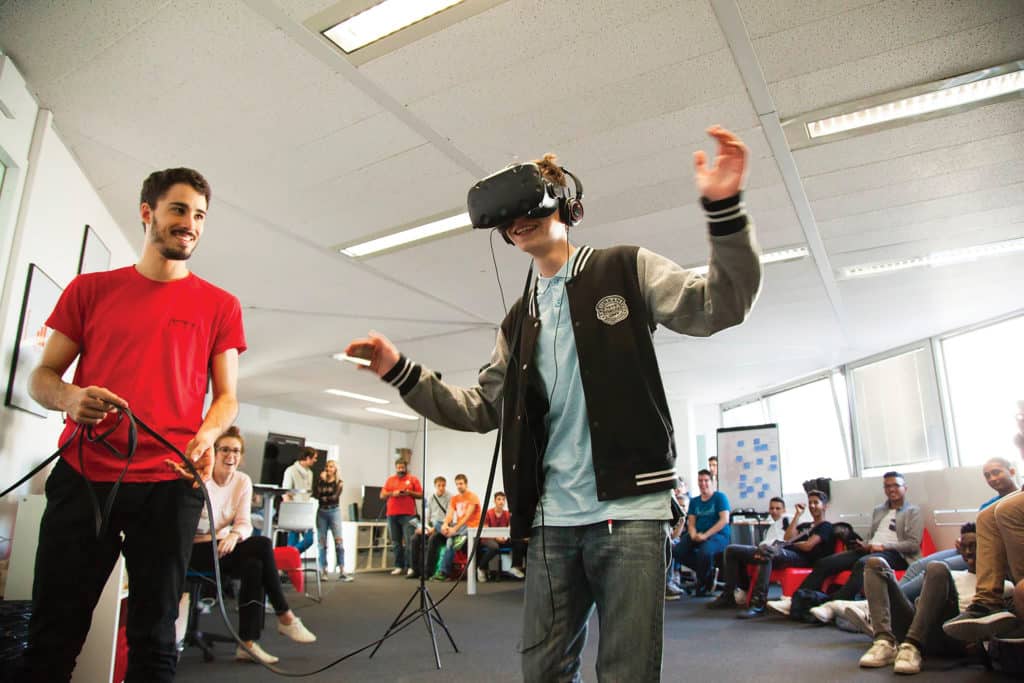The Covid crisis has had major negative effects on many fields of activity. Under the imperative of new realities however, some domains are gaining traction. One type of technology is winning ground in this peculiar period: Virtual Reality.
Swearing by innovation
Now more than ever, it is important to provide virtual alternatives to physical experiences, like going to work, attending an event, following classes, etc. To achieve that, VR seems to be the go-to solution, with the potential to save both businesses, and people’s mental health.
As a global trend, the corporate world is enthralled by digital transformation and is investing many resources into the roll-out of technology projects. As a consequence, innovations keep accelerating. Even small and medium-sized businesses are surfing the wave, investing capital in disruptive technologies, all too conscious that their future depends on it.
Innovation has unquestionably become a necessity, not a mere choice.
Altheria introduces you to VR
To know more about what virtual reality has to offer, we invited Cyprien de Barros to share with us his insight as CEO of Altheria Solutions – a Belgian start-up born in 2018 that provides Virtual Reality solutions to businesses. We share Cyprien’s down-to-earth outlook on the VR industry when he states that “VR is coming across as one of the critical disruptive technologies, but it must be used at the right place, with the right people, at the right time.”
There are few sectors in which VR makes as big an impact as in training and education. Thanks to Logia, Altheria’s first product, industrial companies can design their own scalable VR trainings. Traditional classroom methods are clearly lacking in a great number of training situations. VR’s high levels of immersion adds new dimensions to teaching methodologies, improving greatly the efficiency of the learning process. Altheria’s product therefore addresses issues that managers, trainers, and educators all around the world face and enables a more complete learning experience. Logia is releasing soon and is available for beta-testing, on request.
Altheria’s ambitions
Emboldened by global trends, Altheria’s ambitions are naturally high: “Altheria Solutions is aiming at becoming a leader in developing and editing VR tools.”
In spite of its high potential for growth, the VR penetration rate in Belgium is astoundingly low.
“Disparities occur within the country: even though Altheria is proud to be a Belgian company, we are saddened by the discrepancies between Brussels, Flanders and Wallonia. The disjointed political environment does not make it easy for companies like ours, leaving it with no other choices than to expand abroad.”
Nevertheless, the fruitful partnerships that Altheria has developed with companies like SKF and Alstom reveal the keen interest that these technologies can arouse.
“We have implemented meaningful use-cases and have been positively impressed by their adoption. Obviously, it has motivated our team to stretch themselves and deliver the best possible customer experience.”
But it is not just Belgium that is falling behind. Europe itself is far from championing the VR scene, the majority of key players being located overseas. Considering that the possibilities for growth in the VR industry are numerous and that the demand is increasing steadily, even more so due to the Covid crisis, Altheria’s goal of “evolving someday into the most significant VR European company”, is clearly within reach. The Covid crisis could also end up as a boosting factor.

Barriers for making progress
Political issues aside, we asked Cyprien what the main barriers are to progress in the VR industry.
First of all, the misconceptions and the misunderstanding of terms are a wide-spread phenomenon: extended reality, virtual reality, augmented reality, mixed reality. The general public is not aware of the specificities of each of these technologies and confusions are all too frequent.
Cyprien suggests regrouping both AR and VR into the XR term.
“At Altheria, we always bear in mind that all XR software must follow three unbreakable rules. The experience must be:
- Immersive, allowing users to be warped into a believable environment;
- Interactive, granting extensive control over the course of the experience;
- Intuitive: the man-machine interface cannot be intrusive, confusing or obtuse, the experience needs to be as natural as possible.
This explains why non-interactive 360° degrees videos shown on a VR headset are abysmally disappointing.“
As it is not a suitable solution for every use-case, the VR experience can therefore miss its target which is why the technology used must be carefully selected in order for the product to make sense.
Secondly, the issue with VR is that people need to experience it to grasp its impact and potential. “Bringing people to the party has proven harder than expected in the first place, but every demo usually makes a massive impression turning the user into a new fan of the technology.”
Thirdly, Cyprien warns, “designing VR can be seen as complex and expensive, making decision makers shy away from it. This is why we need creative VR companies which offer solutions that can turn the experience into reality. What we are looking for here is a way to drastically lower both the psychological and cost barriers to entry.”
Despite these challenges, VR is expanding in various important sectors: training, education, healthcare and marketing. Overall, “it boils down to business-to-business (B2B) applications and it has happened that the industrial world is the one that has adopted it the fastest. VR can be seen as a short-lived gadget in other sectors, especially in a business-to-consumers (B2C) environment, with the notable exception of gaming.”
From dream to code
Altheria receives Epitech students as interns and generally encourages youngsters to seek knowledge of and work in the high-tech industry.
“There is a ton of customer needs to solve, thousands of use-cases to cover and a bazillion features to invent. Working in the VR sector is incredibly rewarding, considering the sheer amount of possibilities.” To that already emboldening statement, Cyprien adds that “even though it is true that the growing VR industry requires talented coders and engineers, let’s not forget what it needs above all: dedicated dreamers.”





